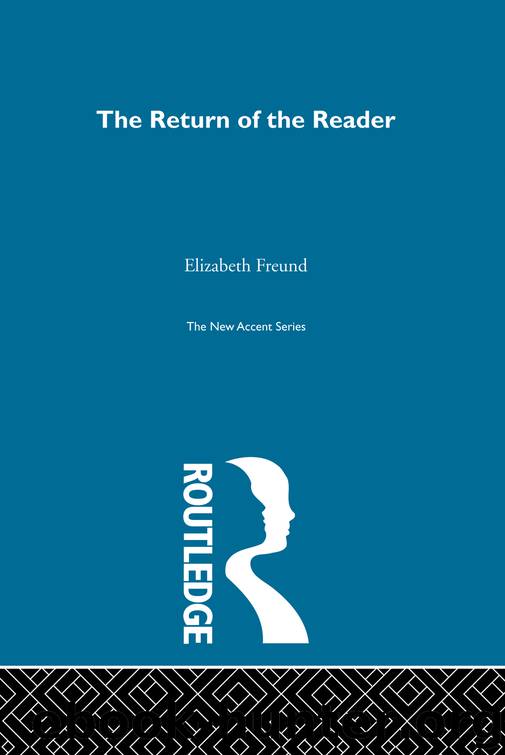Return of Reader by Freund Elizabeth;

Author:Freund, Elizabeth;
Language: eng
Format: epub
ISBN: 1460921
Publisher: Routledge
5
The relation of the reader to daydreaming: Norman Holland and transactive criticism
scooped out
By help of dreams …
(Wordsworth, Home at Grasmere)
One predictable turn taken by the disaffection with a supposedly impersonal ideal of literary criticism was in the direction of psychoanalytic criticism whose promise to uncover new areas of the self combined with the renascent interest in readers and the reading process.
The literary critic comes to psychoanalysis because psychoanalysis promises to tell him something about people. Psychoanalysis has nothing, nothing whatsoever, to tell us about literature per se. But psychoanalysis, particularly in its theories of character, has a great deal to tell us about people engaged in literature, either writing it or reading it or being portrayed in it.
(Holland 1982, p. 31)
This surprisingly precipitate statement by Norman Holland, the subject of this chapter and the leading proponent of a psychoanalytic approach to reader-response criticism, betrays the uneasy sense of discontinuity and asymmetry which has haunted the coupling of psychoanalysis and literary analysis in traditional Anglo-American psychoaesthetic ventures. It would not be unfair to say that on some very general level Holland speaks for the powerful and influential mainstream attitude to the subject. The correspondence or sympathy between psychoanalysis and literary analysis is frequently acknowledged only to be rapidly confined to the realm of ‘people’ rather than ‘literature’ as though to deny or bracket the question of the inextricable entanglement of human experience in linguistic symbolization.
My point is of course grossly reductive, as any history of the relationship between these two modes of interpretation will reveal, yet this history, from its Freudian inauguration, has arguably been attended by a recurrent imbalance. One prominent feature of this imbalance can be traced in the attitude which takes for granted the competence and prerogative of psychoanalysis to teach literature something about itself and its unconscious motives, whereas literature is granted little or nothing to teach psychoanalysis about itself. It is only recently that this asymmetry has been observed and challenged by both literary critics and psychoanalysts who are rediscovering and re-emphasizing the literary and textual nature of psychoanalytic knowledge. Under the impact of Jacques Lacan’s revisionary reading of Freud, for example, we are learning to read the unconscious ‘like a language’ in which the sign (‘letter’ or ‘character’) is the symbol of a lack or absence (Lacan 1972). This interesting development in the history of psychoanalysis has opened up the possibility of ‘re-inventing’, as Shoshana Felman puts it, the mutual relationship of literary analysis and psychoanalysis as the demarcation of a site or topos of reading. Rather than subordinate one discipline and risk its assimilation into the other, the new reciprocity aspires to subvert the erstwhile master-slave relationship by showing how ‘in the same way that psychoanalysis points to the unconscious of literature, literature, in its turn, is the unconscious of psychoanalysis’ (Felman 1977, p. 10).
Since psychoanalytically oriented reader-response criticism (and Holland’s in particular) has declared its allegiance to people and to the assumptions of American ego-psychology and object-relations theory,1 and has preferred to avoid
Download
This site does not store any files on its server. We only index and link to content provided by other sites. Please contact the content providers to delete copyright contents if any and email us, we'll remove relevant links or contents immediately.
| Books & Reading | Comparative Literature |
| Criticism & Theory | Genres & Styles |
| Movements & Periods | Reference |
| Regional & Cultural | Women Authors |
4 3 2 1: A Novel by Paul Auster(12393)
The handmaid's tale by Margaret Atwood(7766)
Giovanni's Room by James Baldwin(7346)
Asking the Right Questions: A Guide to Critical Thinking by M. Neil Browne & Stuart M. Keeley(5775)
Big Magic: Creative Living Beyond Fear by Elizabeth Gilbert(5774)
Ego Is the Enemy by Ryan Holiday(5450)
The Body: A Guide for Occupants by Bill Bryson(5097)
On Writing A Memoir of the Craft by Stephen King(4944)
Ken Follett - World without end by Ken Follett(4734)
Adulting by Kelly Williams Brown(4574)
Bluets by Maggie Nelson(4559)
Eat That Frog! by Brian Tracy(4540)
Guilty Pleasures by Laurell K Hamilton(4449)
The Poetry of Pablo Neruda by Pablo Neruda(4109)
Alive: The Story of the Andes Survivors by Piers Paul Read(4033)
White Noise - A Novel by Don DeLillo(4012)
Fingerprints of the Gods by Graham Hancock(4004)
The Book of Joy by Dalai Lama(3986)
The Bookshop by Penelope Fitzgerald(3854)
